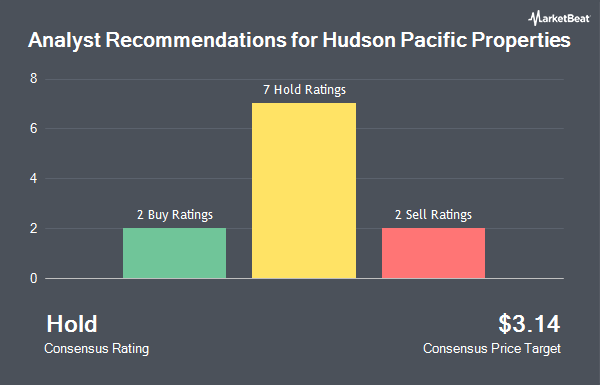Hudson Pacific Properties, Inc. (NYSE:HPP - Get Free Report) has been given a consensus recommendation of "Reduce" by the eleven brokerages that are covering the company, Marketbeat.com reports. Two equities research analysts have rated the stock with a sell rating, eight have assigned a hold rating and one has given a buy rating to the company. The average 12-month target price among brokerages that have covered the stock in the last year is $6.17.
A number of research firms have recently commented on HPP. Wolfe Research cut Hudson Pacific Properties from an "outperform" rating to a "peer perform" rating in a research note on Wednesday, August 14th. Piper Sandler cut their price objective on Hudson Pacific Properties from $5.00 to $4.50 and set a "neutral" rating on the stock in a research report on Friday, November 15th. Bank of America decreased their target price on Hudson Pacific Properties from $4.50 to $4.00 and set an "underperform" rating for the company in a research report on Thursday, August 22nd. Jefferies Financial Group cut shares of Hudson Pacific Properties from a "buy" rating to a "hold" rating and cut their price target for the stock from $5.50 to $5.00 in a report on Tuesday, November 12th. Finally, Scotiabank decreased their price objective on shares of Hudson Pacific Properties from $7.00 to $6.00 and set a "sector perform" rating for the company in a report on Monday, August 26th.
View Our Latest Stock Analysis on HPP
Hudson Pacific Properties Price Performance
Shares of HPP stock remained flat at $3.56 during trading hours on Friday. 3,224,200 shares of the company were exchanged, compared to its average volume of 3,159,876. Hudson Pacific Properties has a 52-week low of $3.01 and a 52-week high of $9.85. The stock's 50-day moving average is $4.19 and its 200-day moving average is $4.75. The company has a current ratio of 1.26, a quick ratio of 1.26 and a debt-to-equity ratio of 1.47.
Insider Activity
In other news, CEO Victor J. Coleman bought 50,000 shares of the stock in a transaction on Monday, November 25th. The stock was bought at an average cost of $3.53 per share, for a total transaction of $176,500.00. Following the completion of the purchase, the chief executive officer now directly owns 437,451 shares in the company, valued at approximately $1,544,202.03. The trade was a 12.90 % increase in their ownership of the stock. The acquisition was disclosed in a filing with the Securities & Exchange Commission, which can be accessed through this link. Also, COO Andy Wattula sold 9,356 shares of Hudson Pacific Properties stock in a transaction on Friday, September 20th. The stock was sold at an average price of $5.28, for a total transaction of $49,399.68. Following the completion of the transaction, the chief operating officer now directly owns 61,068 shares in the company, valued at $322,439.04. This represents a 13.29 % decrease in their ownership of the stock. The disclosure for this sale can be found here. Insiders own 2.95% of the company's stock.
Institutional Trading of Hudson Pacific Properties
A number of institutional investors have recently made changes to their positions in HPP. Millennium Management LLC boosted its stake in Hudson Pacific Properties by 282.7% in the 2nd quarter. Millennium Management LLC now owns 1,786,692 shares of the real estate investment trust's stock worth $8,594,000 after purchasing an additional 1,319,869 shares in the last quarter. Scion Asset Management LLC acquired a new stake in shares of Hudson Pacific Properties during the second quarter worth $5,505,000. UBS AM a distinct business unit of UBS ASSET MANAGEMENT AMERICAS LLC grew its holdings in shares of Hudson Pacific Properties by 450.9% during the third quarter. UBS AM a distinct business unit of UBS ASSET MANAGEMENT AMERICAS LLC now owns 1,066,056 shares of the real estate investment trust's stock valued at $5,096,000 after buying an additional 872,538 shares during the last quarter. GSA Capital Partners LLP grew its holdings in shares of Hudson Pacific Properties by 1,822.5% during the third quarter. GSA Capital Partners LLP now owns 760,086 shares of the real estate investment trust's stock valued at $3,633,000 after buying an additional 720,549 shares during the last quarter. Finally, Charles Schwab Investment Management Inc. increased its position in shares of Hudson Pacific Properties by 13.8% in the 3rd quarter. Charles Schwab Investment Management Inc. now owns 5,209,577 shares of the real estate investment trust's stock valued at $24,902,000 after acquiring an additional 630,932 shares during the period. Institutional investors and hedge funds own 97.58% of the company's stock.
About Hudson Pacific Properties
(
Get Free ReportHudson Pacific Properties NYSE: HPP is a real estate investment trust serving dynamic tech and media tenants in global epicenters for these synergistic, converging and secular growth industries. Hudson Pacific's unique and high-barrier tech and media focus leverages a full-service, end-to-end value creation platform forged through deep strategic relationships and niche expertise across identifying, acquiring, transforming and developing properties into world-class amenitized, collaborative and sustainable office and studio space.
See Also

Before you consider Hudson Pacific Properties, you'll want to hear this.
MarketBeat keeps track of Wall Street's top-rated and best performing research analysts and the stocks they recommend to their clients on a daily basis. MarketBeat has identified the five stocks that top analysts are quietly whispering to their clients to buy now before the broader market catches on... and Hudson Pacific Properties wasn't on the list.
While Hudson Pacific Properties currently has a "Reduce" rating among analysts, top-rated analysts believe these five stocks are better buys.
View The Five Stocks Here
Options trading isn’t just for the Wall Street elite; it’s an accessible strategy for anyone armed with the proper knowledge. Think of options as a strategic toolkit, with each tool designed for a specific financial task. Keep reading to learn how options trading can help you use the market’s volatility to your advantage.
Get This Free Report
Like this article? Share it with a colleague.
Link copied to clipboard.